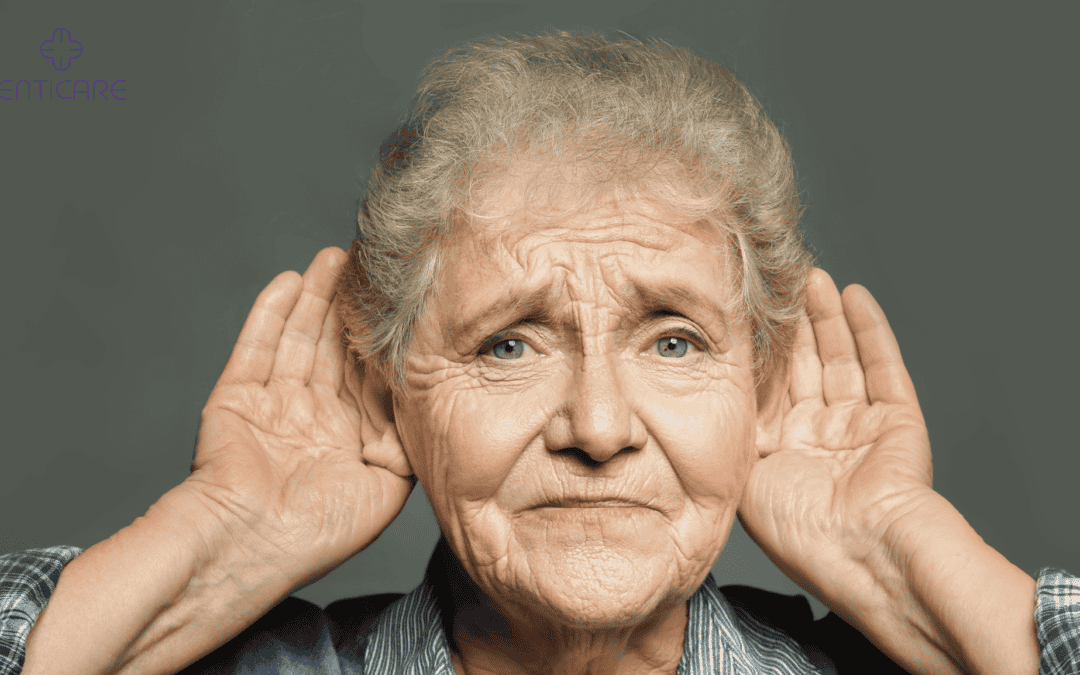An echo in the ear—often described as a ringing or reverberating sensation—can be both irritating and concerning. Muffled hearing is another common symptom accompanying this condition, usually related to ear blockage, pressure changes, or Eustachian tube dysfunction. Many experience this echo, or “autophony,” at some point, where their voice or sounds seem to reverberate inside their head. Here, we’ll cover the most common causes of this condition and what you can do about it.

What is Echo in the Ear?
Echo in the ear, also known as autophony, is a condition where a person hears their own voice or internal sounds louder than usual. This can be disturbing and is often described as hearing an echo or reverberation of one’s voice. Various factors can contribute to this phenomenon, including middle ear diseases, Eustachian tube dysfunction, and structural abnormalities within the ear. In some cases, an echo in the ear can be a symptom of a more serious underlying condition, such as Superior Canal Dehiscence Syndrome (SCDS). Common issues like earwax buildup, ear infections, or sinusitis can also lead to this echoing sensation. Understanding the root cause is crucial for effective treatment and relief.
What Causes the Echo in the Ear?
The sensation of an echo in one’s ear arises from disruptions in how sound waves travel through the ear, either due to blockages, ear infections, or issues in the inner ear. This phenomenon, often called double hearing or diplacusis, can result from conditions affecting the ears, leading to an echoing sensation. Knowing the cause can help guide treatment.
Earwax Buildup
Excessive earwax can obstruct the ear canal, trapping sound and causing an echo-like effect. This echo usually resolves once the blockage is removed through earwax removal or other treatments.
Eustachian Tube Dysfunction
The Eustachian tube helps equalize pressure in the middle ear. Still, blocking or swelling can create uncomfortable pressure, leading to a sensation of fullness, echo, or muffled sounds.
Sinus Infections and Colds
Colds or sinus infections can cause ear pressure changes, which may echo your voice. Sinusitis, a specific type of sinus infection, can also lead to these symptoms. A painful ear infection can lead to similar symptoms and may require medical intervention. Treating the sinus or cold infection often resolves the issue.
Medical Conditions Leading to Echo in the Ear
Sometimes, the echo in your ear could signal an underlying health condition that affects your hearing. This uncomfortable pressure is often associated with excess fluid buildup in the ear, which can be caused by allergies, Eustachian Tube Dysfunction, sinus infections, or otitis media.
Tinnitus
Tinnitus involves hearing sounds—like ringing, buzzing, or echoing—that have no external source. It can range from mild to severe and is often linked to prolonged exposure to loud noises or age-related hearing loss.
Meniere’s Disease
Meniere’s Disease is a chronic condition that affects the inner ear. It can lead to symptoms such as vertigo, hearing loss, and a sensation of fullness or echo in the ear. To prevent long-term damage, medical management is required.
Otitis Media (Middle Ear Infection)
Middle ear infections, especially common in children, can cause fluid buildup behind the eardrum. This fluid disturbs normal hearing and can cause sounds to echo. However, most middle ear infections are clear with appropriate treatment.

Environmental Factors and Lifestyle Habits That Can Cause Echo
Certain lifestyle factors and environmental conditions can exacerbate or trigger the sensation of echo in the ear, including barotrauma.
Loud Noise Exposure
Repeated exposure to loud sounds, such as music concerts or construction noise, can damage the tiny hair cells in the inner ear, leading to hearing problems, including echoes and ringing.
Use of Earbuds and Headphones
Listening to music or podcasts at high volumes with earbuds or headphones can contribute to hearing issues. Constant loud sound waves near the eardrum can lead to temporary or permanent echoing sensations.
Barotrauma from Flying or Diving
Pressure changes during flights or deep dives can impact the middle ear and create an echo sensation. Frequent travelers or divers may experience these symptoms more often, which resolve once ear pressure normalizes.
Diagnosing the Cause of Echo in the Ear
Identifying the exact cause of an ear echo often requires a hearing test and medical evaluation. Knowing what to expect during diagnosis can help you feel more prepared.
Hearing Tests and Audiometry
Audiologists perform a hearing test to measure your hearing ability across different frequencies. Depending on the results, a hearing professional may recommend a hearing aid, which can significantly improve the quality of life for individuals experiencing substantial hearing loss. Audiometry can identify hearing loss or echoing issues and help determine if an underlying condition is present.
Imaging Tests
For cases where structural issues in the ear might be causing the echo, an MRI or CT scan can help. These scans allow doctors to detect abnormalities in the inner ear or surrounding areas.
Medical Examination of the Ear
An ear, nose, and throat (ENT) specialist can examine your ear canal and eardrum using an otoscope. They may check for infections, fluid, or any visible blockages, such as earwax, which can create a sensation of echo.

Treatment Options to Manage or Resolve Ear Echoing
Thankfully, many cases of echo in the ear can be treated effectively. Understanding the available treatment options, including sound therapy, can provide relief and improve your hearing experience.
Earwax Removal and Cleaning
If earwax buildup is the cause, earwax removal by a professional often resolves the echo sensation quickly. Avoid inserting objects into the ear to prevent pushing wax further inside.
Medications for Infections and Inflammation
Antibiotics or anti-inflammatory medications often help with echoes caused by infections. Completing the treatment usually clears the echo as the infection resolves.
Hearing Aids or Sound Therapy for Tinnitus
For those with chronic tinnitus, hearing aids or sound therapy devices can minimize echo-like symptoms by introducing ambient noise that masks the ringing or buzzing sounds.
When to Seek Medical Attention
If you experience any of the following, seek medical attention immediately:
- Sudden or Severe Hearing Loss: A sudden or severe loss of hearing can be alarming and requires prompt medical evaluation.
- Painful Ear Infection or Sinusitis: A painful ear infection or sinusitis can cause significant discomfort and may lead to echo in the ear.
- Persistent or Worsening Echo: If the echo in your ear persists or worsens over time, it’s important to consult a healthcare professional.
- Difficulty Hearing External Sounds: Struggling to hear external sounds due to the echo can impact daily life and should be addressed by a specialist.
- Vibrating or Ringing Head Sensation: A sensation of the head vibrating or ringing can be a sign of an underlying issue that needs medical attention.
- Muffled Hearing: Persistent muffled hearing or a sensation of cotton balls in the ears can indicate a problem that requires treatment.
- Double Hearing: Experiencing double hearing or perceiving two sounds from a single stimulus can be disorienting and should be evaluated by a professional.
Take Action for Lasting Relief from Ear Echoes
If you experience ongoing echoing in your ear, it may be time to speak to a specialist. Identifying and addressing the underlying cause can help restore clear hearing and improve your quality of life. Schedule an appointment with our hearing specialists at Enticare to explore solutions tailored to your needs.

